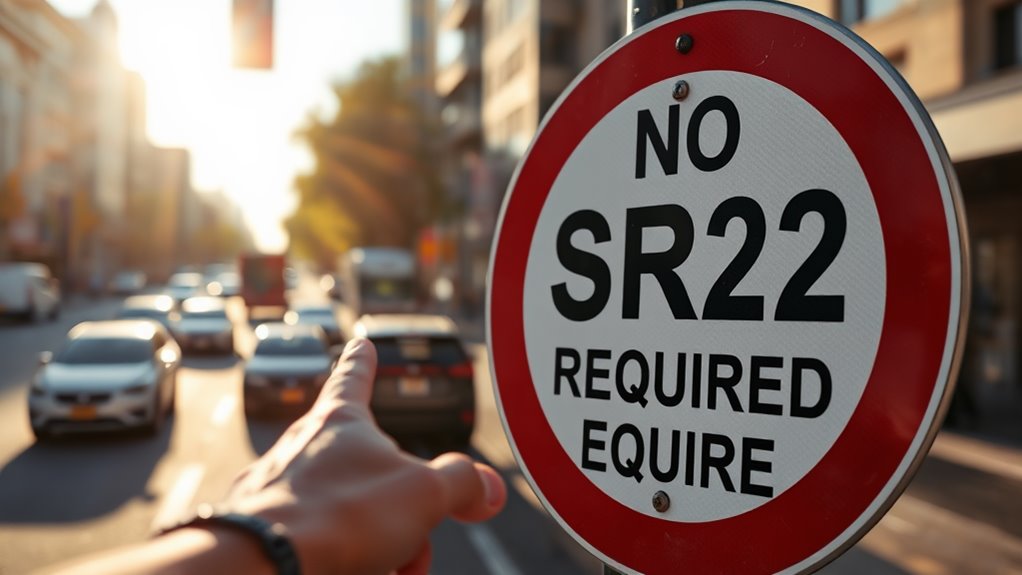
Many people hold misconceptions about insurance, particularly regarding terms like SR22. This certificate of financial responsibility often confuses drivers, leading to misunderstandings about its implications and requirements. It's essential to grasp the nuances of SR22 and how it fits into the broader landscape of insurance. By clarifying these points, you can make more informed decisions about your coverage and avoid potential pitfalls. Let's explore key insights to enhance your understanding.
Key Takeaways
- Clarify that SR22 is not a type of insurance, but a certificate proving financial responsibility after serious offenses.
- Emphasize that increased insurance rates stem from violations, not the SR22 filing itself.
- Educate about the duration of SR22 requirements, typically lasting three years after a first DUI offense.
- Highlight the importance of maintaining continuous coverage to avoid license suspension and ensure compliance.
- Encourage shopping around for insurance to manage costs effectively, as rates vary by provider and location.
Understanding What SR22 Insurance Really Is

While many drivers may associate SR-22 insurance solely with penalties, it's essential to understand that it serves an important function in maintaining compliance with state vehicle insurance requirements.
An SR-22 is a document proving you meet these requirements, often needed after serious traffic offenses like DUI or DWI. It demonstrates your financial responsibility by showing that you have the minimum liability insurance mandated by your state. Additionally, the SR-22 is filed by insurance companies with the state on your behalf to validate your insurance coverage. In Ohio, an SR-22 is specifically required for certain traffic violations that indicate a higher risk to public safety.
An SR-22 is essential for proving financial responsibility after serious traffic offenses, ensuring compliance with state insurance requirements.
If you've faced a license suspension or have been involved in an accident without insurance, you might also need one. Keep in mind that the duration varies, typically lasting three years, and continuous coverage is important.
Failing to maintain compliance could lead to further penalties, including license suspension.
SR22 Insurance Is Not a Type of Insurance
Many drivers mistakenly believe that SR22 insurance is a distinct type of insurance policy. In reality, it's a certificate of financial responsibility required by certain states. This certificate proves that you meet the minimum liability insurance limits mandated by law.
The filing process involves your insurer submitting the SR22 form to the state, confirming you have adequate coverage. Misconceptions arise due to the specialized term "SR22 insurance", which implies a separate policy.
Additionally, drivers often associate SR22 with serious infractions like DUIs, further complicating understanding. Remember, SR22 doesn't alter your existing insurance but adds a filing requirement, so it's essential to grasp its true nature to avoid confusion and guarantee compliance with your state's regulations.
SR22 Filing Does Not Increase Your Insurance Rates
SR22 filing often gets the blame for increased insurance rates, but this assumption overlooks the true source of the cost hike.
The SR22 itself is a form that merely certifies your financial responsibility after a serious violation, such as a DUI or at-fault accident. It's the underlying violation that increases your insurance premiums, not the filing.
Insurance providers view those violations as indicators of higher risk, leading to elevated rates. Additionally, factors like location and the specific insurance provider's policies also play significant roles.
You Don't Need an SR22 for Every Traffic Violation

Do you really need an SR22 for every traffic violation? The short answer is no.
SR22 forms are specifically required for serious offenses, such as DUIs or reckless driving, serving as proof of financial responsibility. Minor infractions, like parking tickets or minor speeding violations, don't necessitate an SR22.
It's crucial to understand that SR22 requirements vary by state, and most states mandate it only under serious circumstances. Maintaining valid insurance and avoiding severe offenses can help you steer clear of unnecessary SR22 filings.
If you face legal issues, addressing them promptly with potential attorney representation may mitigate the need for an SR22, ensuring you keep your driving privileges intact without additional complications.
SR22 Insurance Is Not Permanent
While it might feel like an SR22 requirement is a permanent mark on your driving record, it's actually only a temporary measure mandated by the state following specific infractions.
Typically, you'll need to maintain an SR22 for about three years after a first DUI offense, but this duration can extend if you have additional violations or serious infractions like reckless driving.
Maintaining an SR22 is typically required for three years after a first DUI, with possible extensions for further violations.
To keep your driving privileges, you must guarantee consistent payment of premiums and timely policy renewals; any lapse can lead to a suspended license.
Remember, while the costs can be intimidating, shopping around can help manage the expense.
Ultimately, adhering to SR22 requirements is essential for regaining full driving rights and improving your insurance rates over time.
SR22 Coverage Is Specific to Ohio Laws
Understanding that SR22 coverage is specific to Ohio laws is important for drivers facing certain legal challenges.
In Ohio, SR22 insurance acts as proof of financial responsibility, especially after serious offenses like DUIs or reckless driving. The Ohio Bureau of Motor Vehicles (BMV) requires insurers to file the SR22 certificate to confirm you meet minimum liability coverage. This filing is essential for regaining or retaining your driving privileges.
If you've been convicted of driving without valid insurance or have accumulated multiple traffic violations, you'll likely need SR22 coverage.
You Can Still Get Insurance With an SR22 Filing

How can you navigate the challenges of obtaining insurance with an SR22 filing? While it may seem intimidating, securing coverage is possible. Here are some key points to evaluate:
- Understand SR22: It's a certificate proving you meet minimum insurance requirements, not insurance itself.
- Explore Options: Non-owner SR22 policies exist, allowing flexibility if you don't own a vehicle.
- Be Prepared for Higher Premiums: Expect increased costs due to the perception of higher risk.
- Stay Compliant: Keeping continuous coverage is essential to avoid penalties and maintain your driving privileges.
Conclusion
Maneuvering the world of insurance can feel like wandering through a dense forest. By understanding the true nature of SR22 and addressing common misconceptions, you're equipping yourself with a compass to guide your way. Just as a seasoned traveler learns from each twist and turn, you too can master your policy and make informed decisions. Embrace this knowledge, and you'll find clarity amidst confusion, ensuring you're prepared for whatever roads lie ahead in your insurance journey.